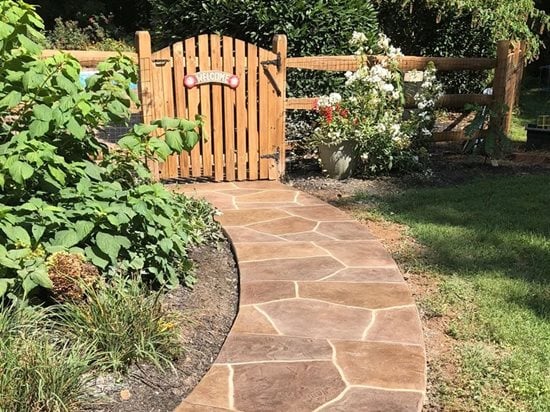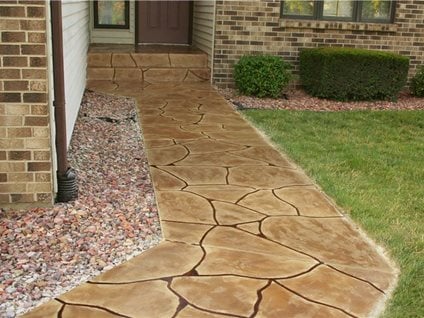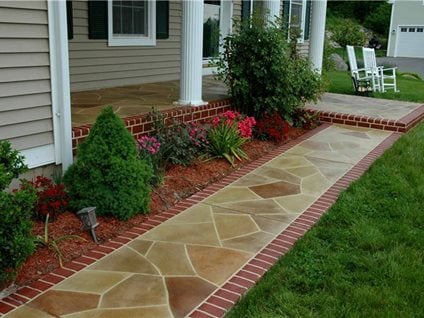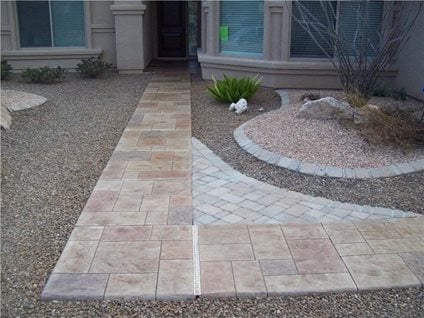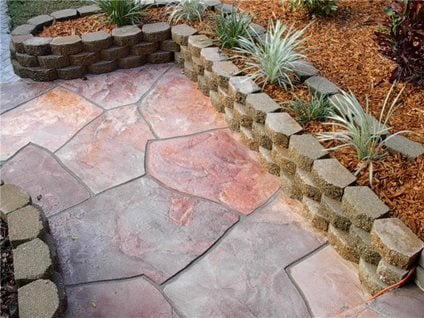- Concrete Overlays Home
- Get the Look - Interior Overlay Pictures
- When to Use a Polymer Overlay
- Comparison Chart of Overlay Systems: Which is best for your project?
- Five Factors to Consider when Choosing a Resurfacing System
- Concrete Overlay Reviews
- Types of Overlays
- Epoxy Coatings
- Microtoppings & Skim Coats
- Self-Leveling Overlays
- Spray-Down Toppings
- Polishable Overlays
- Stamped Concrete Overlays
- Preparing Concrete for Resurfacing
- Concrete Resurfacing
- Reducing Bond Failures Caused by Moisture-Vapor Transmission
- Don't Let Water Vapor Delaminate Your Overlay: How to seal concrete before an overlay
- How-To Tips for Installing Concrete Overlays
- Answers to Common Questions About Concrete Overlays: Advice from expert Chris Sullivan
- How to Add Color to Concrete Overlays
- How to Protect and Maintain Resurfaced Concrete
- Overlay Tools: Seven essential tools for concrete resurfacing
- Related Information
- Concrete Overlay Videos, with Bob Harris
- Decorative Concrete Overlays: A primer of the various overlay types and the decorative possibilities with each
- Vertical Concrete Overlays: Lightweight cement-based overlays mimic stone, brick, and other wall textures
Resurfacing Concrete Walkways
Information and design ideas for resurfacing existing sidewalksConcrete sidewalks come in a close second to concrete driveways in the amount of traffic they receive. And just like driveways, they are often treated with deicing salts in the winter. All that wear and tear and chemical abuse can take a toll on the appearance of concrete walkways by causing abrasion, spalling, stains and freeze-thaw damage.
Find concrete resurfacing contractors near me.
The good news is that if the damage is superficial, as is often the case, it’s possible to restore and upgrade the appearance of your concrete walkway rather than go through the expense and hassle of replacing it. Resurfacing with a cement-based overlay or microtopping is a cost-effective option for adding a decorative touch to an existing concrete walkway while covering up minor flaws and discoloration. After the overlay is applied to the existing concrete, it can then be stamped, stained, stenciled or engraved to add color or simulate the look of brick, stone, tile or slate.
Before beginning a concrete walkway resurfacing project, be sure to consult a professional to determine if your concrete can be resurfaced successfully. If the concrete slab is settling or is badly cracked, resurfacing may not be a viable option.
Best Coatings for Resurfacing a Walkway
Popular resurfacing products for walkways and sidewalks include:
Make sure the coating you pick for your walkway is durable, UV-resistant and has good traction. In some cases, resurfacing may not be the only option. See more ways to make a concrete walkway look better.
Concrete Walkway Resurfacing Projects
This concrete walkway and steps were transformed with a colored and patterned overlay. Faux grout lines were created by taping off the flagstone pattern before the overlay was applied.
Adding the Look of Stone and Brick to an Existing Walkway
A polymer overlay with a hand-taped stone pattern and brick border gave this existing concrete entryway new life.
Italian Slate Sidewalk Overlay
This concrete walkway was rejuvenated with a concrete overlay stamped in a seamless Italian Slate pattern and hand painted with water-based antiquing stains.
To replicate the look of inlaid slate, this concrete sidewalk was covered with a gray-colored cement overlay to create the look of a grout base. The slate pattern was delineated with duct tape, and then an acrylic cement topping was applied and hand painted to create a marbling effect.
For more information: Concrete Resurfacing Decorative Concrete Overlays When to Use an Overlay
 Rapid Set Skim Coat
Repairs, levels, and smooths concrete for applications.
Rapid Set Skim Coat
Repairs, levels, and smooths concrete for applications.
 Thin Micro-Topping
Produces durable surface to color or stain
Thin Micro-Topping
Produces durable surface to color or stain
 Self Leveling Overlay
Find the overlay to meet your project's needs
Self Leveling Overlay
Find the overlay to meet your project's needs
 T1000 Stampable Overlay
For use with resurfacing concrete floors and hardscapes.
T1000 Stampable Overlay
For use with resurfacing concrete floors and hardscapes.
 Kemiko® Buildable Overlay
Decorative interior or exterior resurfacing
Kemiko® Buildable Overlay
Decorative interior or exterior resurfacing
 Flooring & Coating System
Epoxy Flooring System designed for concrete
Flooring & Coating System
Epoxy Flooring System designed for concrete
 Stamped Concrete Overlay
Warm weather and cold weather formulas
Stamped Concrete Overlay
Warm weather and cold weather formulas
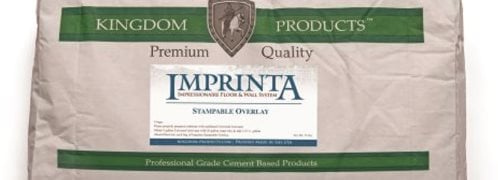 Imprinta Stampable Overlay
2-component system
Imprinta Stampable Overlay
2-component system
